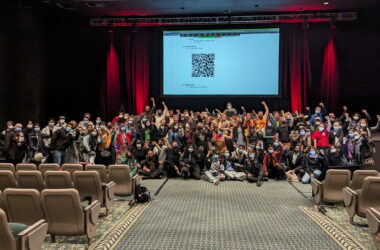 Logan Smith
Logan SmithPsychology professor Donald Taylor does his best to make students feel comfortable in his office.
“I tell my students that if they want to come and see me, we don’t have to talk about a chapter in the book, but they have to say something nice about my bottled lights,” he said as he pointed to a bottle full of Christmas lights sitting on his desk.
Unfortunately, most students are still afraid to come in and see him. He’s not alone: sparsely attended office hours are common all over McGill.
More often than not, professors and TAs find themselves alone during the time they designate for students.
“The number who come in is far less than you would expect,” said Taylor.
According to Louis Hermo, a professor in anatomy and cell biology, students are probably just intimidated.
“I would say most of the students are really shy and they don’t like to come see the professors,” Hermo said. “I think they feel that maybe we may jump down their throats or be aggressive with them.”
Hermo receives more questions through emails than physical meetings.
Gershon Hundert, a history professor, agreed that class size probably correlates with the frequency and amount of office visits by students.
“I think that in the smaller classes the dynamics might be different because the professor becomes an actual human being and may be thought of as more accessible,” he said.
The second problem, Taylor said, is McGill’s structure.
“The university indirectly sends the message of education as compartmentalized and class-driven so as to give students the idea of going to university as only of going to class,” he said. “Their life is class, home, and their computers, where they have access to everything. The on-campus environment of intellectual stimulation is not part of the current education corporation that we’ve become.”
According to Taylor, all of this means that in their office hours, professors either get visits from students who are greatly excelling or those who are struggling. For the vast majority, education is scheduled—and office hours aren’t included.
“The university needs to propagate the idea that students are expected to learn and fully participate outside of classes,” Taylor said. “[Attending university] should involve at the very minimum going to class, but more importantly talking to professors and engaging with each other as students on intellectual matters.”
Hundert said that students think of attending university as getting done only what is required and nothing more.
“It should be seen as a great intellectual supermarket in which you have four years to take advantage of all these interesting people who have things to say,” he said.
Hundert obliges his students to come see him to talk about their term papers.
“That way, I see each of them at least once to talk one on one,” he said.
Furthermore, he sees office hours as an important way to deepen the student’s understanding.
“By having a conversation about whatever idea or notion it is in consideration its an educational opportunity that most students simply don’t take advantage of,” he said.
For simple questions, professor Craig Mandato said that “A TA is just as good, if not better, at answering than me.”








